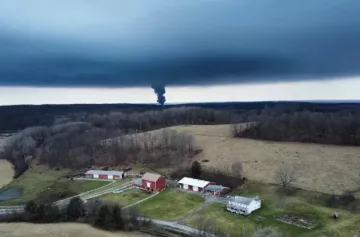
On July 6, 2013, a runaway train loaded with explosive crude oil derailed in the small town of Lac-Mégantic, Quebec. It was one of the deadliest rail disasters in Canadian history.
On February 3, 2023, a train carrying hazardous chemicals derailed in East Palestine, Ohio. The accident released carloads of hazardous materials—including vinyl chloride, benzene residue, and butyl acrylate—into the soil and water.
After three days, amid growing fears of explosions, authorities ordered residents to evacuate a 1 mile-by-2 mile area. Norfolk Southern crews then executed a “controlled release” and burn of five tanks of vinyl chloride, which covered the town with thick, noxious smoke.
The fire was finally extinguished on February 8. Air and water were deemed safe by the EPA. The evacuation order was lifted.
However, residents returning to their homes soon reported unusual symptoms, including a burning sensation when breathing, congestion, rashes, weakness, headaches, and nausea.
It has been estimated that over 43,700 marine animals within 5 miles of East Palestine were killed. There also are reports of sick animals, struggling with paralysis, chemical burns, and eye problems, as far as 7 miles outside of the evacuation zone.
“Unbelievably, the EPA deferred to Norfolk Southern to assess air, water, and soil quality,” said Gerri Songer, chair of the Woods & Wetlands Group’s Rail Safety campaign. “In essence, they’re leaving Norfolk Southern free to investigate itself.”
To date, at least 10 class action lawsuits have been filed against Norfolk Southern.
One argues that the company “ignited a 1 million pound-plus chemical burn pit … dispersing toxic chemicals for miles and across state lines into Pennsylvania. ... There is a major problem with setting vinyl chloride on fire—it creates phosgene gas. Phosgene gas is a chemical warfare agent banned under the Geneva Conventions and was responsible for the deaths of about 85,000 people in World War I.”
Photo: David Anderson